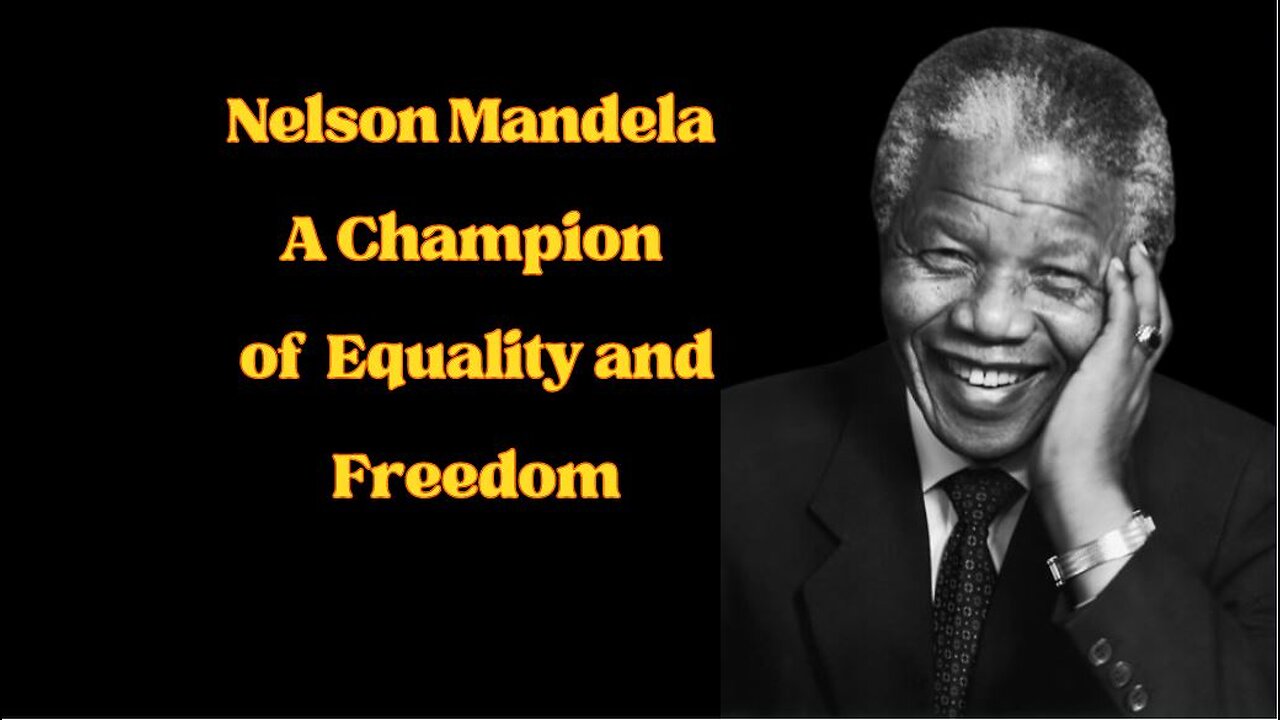Premium Only Content

Nelson Mandela: A Champion of Equality and Freedom
Nelson Mandela: A Champion of Equality and Freedom
Introduction
Nelson Mandela, a name synonymous with courage, resilience, and unwavering commitment to justice, was a visionary leader who transcended barriers and fought tirelessly against apartheid in South Africa. Born on July 18, 1918, in Mvezo, a village in the Eastern Cape province, Mandela's life journey would become an inspiring tale of triumph over adversity. From his early struggles against racial oppression to becoming the first democratically elected President of South Africa, Mandela's legacy as a symbol of hope and unity remains indelible. This biography delves into the life of Nelson Mandela, tracing his extraordinary path that forever changed the course of history.
Early Life and Education
Nelson Rolihlahla Mandela was born to the Thembu royal family, where his father served as a chief. Mandela's upbringing instilled in him a deep sense of cultural pride and social responsibility. Growing up in a society marred by racial segregation, Mandela witnessed firsthand the injustices suffered by his fellow Africans. His education at the University of Fort Hare exposed him to the nationalist movements that sought to dismantle apartheid, fueling his passion for change.
The Fight Against Apartheid
Mandela's involvement in the African National Congress (ANC) marked the beginning of his lifelong commitment to dismantling apartheid. Faced with increasing racial oppression, Mandela and his ANC comrades employed both peaceful protests and acts of civil disobedience to challenge the unjust laws enforced by the apartheid government. As the apartheid regime intensified its crackdown on activists, Mandela's leadership skills and unwavering dedication to the cause propelled him to the forefront of the struggle.
Imprisonment and Robben Island
In 1964, Mandela's fight for equality would cost him his freedom. He was sentenced to life imprisonment on charges of sabotage and conspiracy to overthrow the government. Mandela spent the next 27 years behind bars, much of it on the notorious Robben Island. Despite the harsh conditions and isolation, Mandela emerged as a beacon of strength and resilience, inspiring not only his fellow prisoners but also the nation he longed to see free.
The Road to Reconciliation
Mandela's release from prison on February 11, 1990, marked a turning point in South Africa's history. His unwavering commitment to nonviolence and reconciliation set the stage for a peaceful transition from apartheid to democracy. Mandela's leadership during the negotiations with President F.W. de Klerk paved the way for the dismantling of apartheid laws and the establishment of a multiracial democratic government.
President Mandela: A New Era
In 1994, Nelson Mandela made history as he became the first black President of South Africa. His presidency was marked by a resolute focus on reconciliation, nation-building, and social justice. Mandela's policies aimed to address the deep-rooted inequalities and heal the wounds of apartheid. His initiatives, such as the Truth and Reconciliation Commission, fostered a spirit of forgiveness and accountability, setting South Africa on a path toward unity and progress.
Legacy and Global Impact
Beyond South Africa's borders, Nelson Mandela's impact reverberated across the globe. His unwavering commitment to human rights and social justice earned him international acclaim and numerous awards, including the Nobel Peace Prize. Mandela's influence extended far beyond his presidency, as he continued to champion causes such as HIV/AIDS awareness, education, and conflict resolution.
Conclusion
Nelson Mandela's life was a testament to the power of resilience, forgiveness, and unwavering commitment to justice. From his early struggles against apartheid to his presidency and beyond, Mandela's legacy continues to inspire generations to fight for equality and inclusivity. His unwavering belief in the power of unity and reconciliation remains a guiding light in a world still grappling with social, racial, and political divisions. Nelson Mandela will forever be remembered as a true icon of our time, a symbol of hope, and an embodiment of the possibility for change.
-
 22:35
22:35
Stephen Gardner
1 day agoBiden's GETS NIGHTMARE notice from Congress!
24.6K57 -
 2:06:40
2:06:40
TimcastIRL
4 hours agoVideo LEAKS Of Woke Judge AIDING Criminal Alien ESCAPE, Claims IMMUNITY | Timcast IRL
146K56 -
 1:43:18
1:43:18
Glenn Greenwald
6 hours agoGlenn Takes Your Questions on the Trump Admin's War with Harvard, Fallout from Wednesday's DC Killing, and More; Plus: Lee Fang on Epstein's Dark Legacy in the USVI | SYSTEM UPDATE #460
101K40 -
 LIVE
LIVE
megimu32
3 hours agoTGI...FORTNITE?!? Friday Night Chill!
295 watching -
 LIVE
LIVE
I_Came_With_Fire_Podcast
11 hours agoEDU DEPT LAYOFFS HALTED | BIDEN CANCER | NVIDIA CRIES | TRUMP
422 watching -
 1:17:06
1:17:06
BEK TV
1 day agoGOVERNMENT COVER-UPS EXPOSED: VACCINE RISKS, PESTICIDES, DIPLOMATIC ASSASSINATIONS & BIDEN SCANDALS
5.28K -
 2:18:18
2:18:18
TheSaltyCracker
4 hours agoLefties Are Killing Jews ReeEEEStream 05-23-25
87.3K188 -
 LIVE
LIVE
SynthTrax & DJ Cheezus Livestreams
12 hours agoFriday Night DJ MIX Livestream 80s Night SPECIAL EDITION with Variety Visuals
192 watching -
 LIVE
LIVE
OhHiMark1776
6 hours ago🟢05-23-25 ||||| Halo Multiplayer Rumble: No. 14 ||||| Halo MCC (2019)
37 watching -

Sm0k3m
8 hours agoHell Diver 2
13.7K1